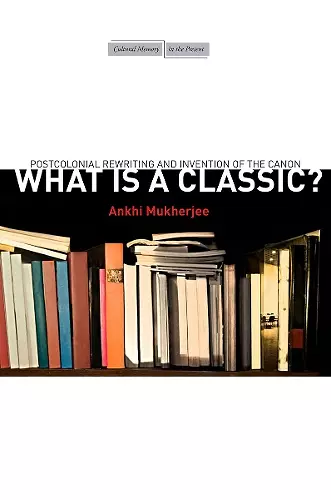What Is a Classic?
Postcolonial Rewriting and Invention of the Canon
Format:Paperback
Publisher:Stanford University Press
Published:11th Dec '14
Currently unavailable, and unfortunately no date known when it will be back
This paperback is available in another edition too:
- Hardback£116.00(9780804785211)

What Is a Classic? revisits the famous question posed by critics from Sainte-Beuve and T. S. Eliot to J. M. Coetzee to ask how classics emanate from postcolonial histories and societies. Exploring definitive trends in twentieth- and twenty-first century English and Anglophone literature, Ankhi Mukherjee demonstrates the relevance of the question of the classic for the global politics of identifying and perpetuating so-called core texts. Emergent canons are scrutinized in the context of the wider cultural phenomena of book prizes, the translation and distribution of world literatures, and multimedia adaptations of world classics. Throughout, Mukherjee attunes traditional literary critical concerns to the value contestations mobilizing postcolonial and world literature. The breadth of debates and topics she addresses, as well as the book's ambitious historical schema, which includes South Asia, Africa, the Middle East, the West Indies, Australia, New Zealand, Europe, and North America, set this study apart from related titles on the bookshelf today.
"Mukherjee's examination of postcolonial rewriting doubtlessly constitutes a major contribution to current postcolonial literary criticism, introducing new perspectives into a debate that almost seemed to have reached a dead end. What is a Classic? is both accessible and intellectually sophisticated; moreover, it stands out due to the enormous scope of the material that is used by the author." -- Marion Gymnich * Interventions: International Journal of Postcolonial Studies *
"This brilliant, entertaining, accessible book will immediately be reviewed and commented on and will become a key text." -- David Palumbo-Liu * Stanford University *
"What Is a Classic? is a brilliant intervention, for its willingness to pose directly the question of literary value and the operations of literary criticism in the consecration and preservation of the texts that are then named as 'classic.' Mukherjee's analysis is much closer to the text, and more literary in its sensibilities, than an intervention like Pascale Casanova's; more flexible in its circuits of influence than the genre-based methods of someone like Franco Moretti; and more attentive to the inequalities of world literary circulation than the world literature methods associated with David Damrosch." -- Madhumita Lahiri * University of Michigan, Contemporary Literature *
"With What Is a Classic?, Ankhi Mukherjee has given us a poised and masterful study in a subject that is at once timely – for the now established postcolonial field – and timeless. To ask 'what is a classic?', Mukherjee points out in conclusion, is to work with the finest fibres that make up the literary 'whose nature is to repeat'. In effect, to be a reader is to be postcolonial, and vice versa, to remake the masterpieces and learn to love them both anew and differently, as Mukherjee demonstrates. In What Is a Classic? we meet a true lover of literature, a 'voracious and ruminative reader' of the first order whose taste in books is eclectic and free-ranging, yet supremely sound." -- Elleke Boehmer * University of Oxford *
"The main concern of the book is not with what a literary canon is, but with how it reaffirms and transforms itself and evades oblivion, and in particular how and why postcolonial authors and critics construct and revive the idea of the classic. In consequence, Mukherjee does not offer any conceptualized answer to the question raised in the title of the book. Frankly, readers acquainted with the development of literary criticism in recent decades do not expect an answer of that kind. However, they expect an erudite and witty discussion of the problem the idea of a classic represents for contemporary criticism, something that . . . Mukherjee's book does with brilliance, bringing in the postcolonial perspective." -- Róbert Gáfrik * Institute of World Literature, Slovak Academy of Sciences, Journal of Postcolonial Writing *
"What is a Classic? is extremely erudite and well written, with a broad grasp of debates on canon formation not only in postcolonial studies but with respect to the Western tradition more generally. This is a book that will prove a landmark in the field, providing a thorough postcolonial qualification to various other offerings on World Literature in the field. In fact, it is impossible to see the book as becoming anything but an abiding classic itself, one that may lead those who come to be acquainted with it to stop perfect strangers and exclaim: 'Here. Read this!'" -- Ato Quayson * University of Toronto *
"What Is a Classic? is a valuable addition to scholarship on canons, canon building, and the meaning of 'classics'...It is a book research scholars in postcolonial literary studies must read. " -- Nirmala Menon * Journal of Postcolonial Literary Inquiry *
"What is a classic? Taking her lead from Augustin Sainte-Beuve, T. S. Eliot, and J. M. Coetzee, Ankhi Mukherjee offers an eloquent case for the question's continuing relevance to literature, literary criticism, and, above all, to the language arts of the postcolony. [This book] brings fresh energy to the longstanding study of imperial cultural authority, attending to both the ideological imposition of that authority and the split literary consciousness of postcolonial writing produced in its wake." -- Urmila Seshagiri * Modernism/Modernity *
ISBN: 9780804795258
Dimensions: unknown
Weight: 395g
296 pages